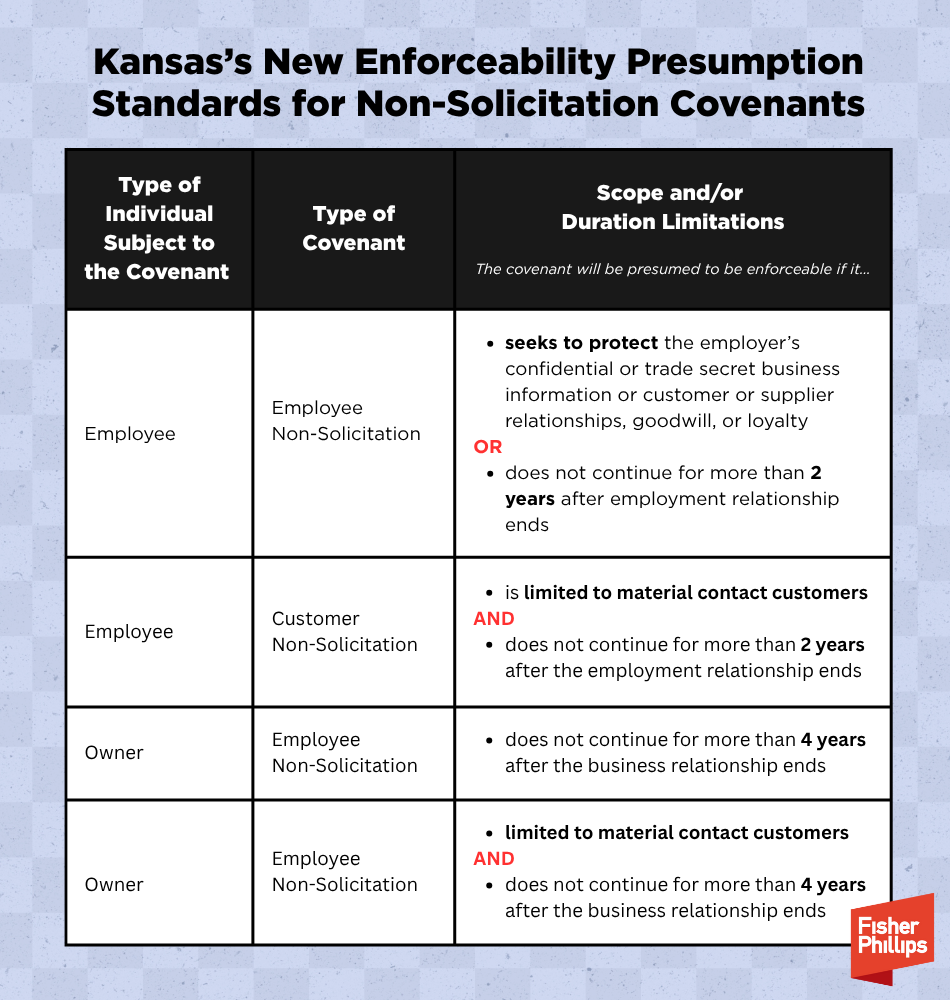Kansas has long been an enforcement-friendly state for restrictive covenants, and it just got friendlier. A new state law, which took effect July 1, provides clearer guidelines and stronger protections for businesses seeking to enforce restrictive covenants. The new framework is especially helpful for employers that use customer or employee non-solicitation terms in their employment contracts. We’ll explain everything Kansas employers need to know about these changes, and what steps you should take next.
Quick Background
Earlier this year, Gov. Laura Kelly signed a bill (SB 241) into law that made clarifying changes to the Kansas Restraint of Trade Act. The SB 241 updates took effect on July 1.
Prior to July 1, the state law required a presumption of enforceability for restrictive covenants in employment agreements so long as they were “reasonable in view of all the facts and circumstances” and did not “contravene public welfare.” While this standard was enforcement-friendly, whether a restrictive covenant was “reasonable” was ultimately left for judges to decide – creating uncertainty over which covenants might be upheld in court.
Overview of New Kansas Law
The SB 241 updates made two key changes, which are now in effect:
- Clear Pathways to Enforceability Presumption. Now, in addition to the broader presumption standard that had already been in place before these updates, the law provides specific parameters for certain types of restrictive covenants that will be presumed to be enforceable. The new standards are discussed in the section below.
- New Backstop for All Restrictive Covenants. If a covenant does not qualify for any of the enforceability presumptions and is determined to be overbroad or not reasonably necessary to protect the company’s business interests, courts now must modify the covenant – but only as reasonably necessary to protect those interests – and enforce it as modified.
The New Enforceability Presumptions
The new enforceability presumption standards are available only for certain non-solicitation covenants and certain provisions requiring notice of an owner’s intent to sell the business.
Presumption Requirements for Non-Solicitation Covenants
These types of covenants will be presumed enforceable so long as they meet the scope and/or duration limitations summarized in the table below.
The law defines these key terms as follows:
- Employee: a current or former employee that agreed to a covenant in writing.
- Material contact customer: any customer or prospective customer that is solicited, produced or serviced, directly or indirectly, by the employee or owner at issue or any customer or prospective customer about whom the employee or owner, directly or indirectly, had confidential business or proprietary information or trade secrets during the employee's or owner's relationship with the customer.
- Owner: a current or former owner or seller of all or any part of the assets of a business entity or any interest in a business entity, including, but not limited to, a partnership interest, a membership interest in a limited liability company or a series limited liability company or any other equity interest or ownership interest.
|
NOTE: Even if a non-solicitation covenant meets one of these new enforceability presumption standards, employees or owners may still challenge the covenant and may still assert any applicable defense at law or in equity for the court’s consideration. |
Presumption for Notice of Intent to Sell Provisions
The SB 241 updates also clarify that a written provision where an owner (as defined by the statute – see above) agrees to provide prior notice of the owner's intent to terminate, sell or otherwise dispose of their ownership interest in a business entity shall be conclusively presumed to be enforceable and not a restraint of trade.
What Kansas Employers Should Do Now
If your business is subject to the Kansas Restraint of Trade Act, here are steps you should consider taking in light of the SB 241 updates now in effect:
- Take stock of your existing restricting covenants. Identify the different types covenants you may have in place with current or former employees or owners.
- Review your existing non-solicitation covenants. You should work with counsel to determine whether your existing non-solicitation covenants qualify for any of the new enforceability presumptions.
- Determine whether to capitalize on the new enforceability presumptions. For example, you may want to modify existing, or design future, non-solicitation covenants to meet the scope and/or duration limitations and qualify for one of the new enforceability presumptions. Work with counsel to understand your options, risk levels, and the best paths forward.
Conclusion
If you have any questions, contact your Fisher Phillips attorney, the authors of this insight, or any attorney in our Employee Defection and Trade Secrets Practice Group. Make sure you are subscribed to Fisher Phillips’ Insight System to get the most up-to-date information directly to your inbox. We constantly monitor new cases, legislation, and regulatory developments to keep you at the cutting edge of the law, so check out Blue Pencil Box for our daily updates on restrictive covenant law.
Sofia Tourgeman, a summer clerk in our Los Angeles office, contributed to this insight.




